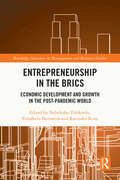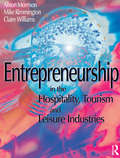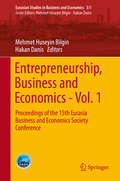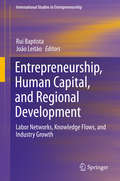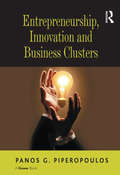- Table View
- List View
Entrepreneurship in the Arts (Discovering the Creative Industries)
by Bonita M. KolbThe need for artists, musicians, actors, singers, designers and other creative individuals to understand basic business concepts so they can successfully pursue their chosen creative profession has only grown since the publication of this textbook, now in its third edition. This popular book teaches business concepts in a way that is relevant to the way that creative students learn.Providing an understanding of the fundamental skills of entrepreneurship, this book enables creatives to launch new businesses, run for‑profit creative industries or manage nonprofit cultural organizations. The book leads the student through the entrepreneurial process starting with finding the right customers to pricing, distribution and promotion. This latest edition has been updated to account for significant changes in the creative industries that have been accelerated by the use of AI in the production of creative products, the challenge of pricing products within a range acceptable to consumers while accounting for the rising cost of production and the increasing need to use social listening skills and technology as a basis of consumer research.Weaving practical advice from successful creatives with pedagogical features such as "Questions to Consider," "Tasks to Complete" and "Visualization Exercises," this textbook continues to be essential reading for creative students.
Entrepreneurship in the Asia-Pacific: Case Studies
by Jing Wang Hua Bai Ke Xing Michitaka KosakaThis book is dedicated to the analysis of the entrepreneurship in successful companies by presenting and comparing a series of case studies in the Asia-Pacific where many new companies have been growing successfully in the 21th century. In total, 5 cases in the manufacturing industry, 4 cases in the services industry, and 3 cases related to new business and social innovation are chosen from The mainland of China, Taiwan, Japan, Australia, Malaysia and Vietnam. Each case provides insight into the entrepreneur’s aspiration, the processes of personal and business developments, the factors of success, and the inspirations drawn from the analysis. These cases are analyzed and compared from the viewpoints of entrepreneur’s motivation, ability of foreseeing changes and opportunities in the future business environment, core resources and innovation, knowledge management and culture for the company, determination and ethos. These are critical factors in value creation for customers and the society, especially in the future business environment. Finally, commonalities and uniquenesses in entrepreneurship relevant to industry sectors and social-economic-cultural contexts are clarified and a typical entrepreneurship model in the Asia-Pacific is proposed.
Entrepreneurship in the BRICS: Economic Development and Growth in the Post-Pandemic World (ISSN)
by Fulufhelo Netswera Ravinder Rena Ndivhuho TshikovhiEntrepreneurship is a tool of innovation promotion that supports sound economic environments as it stimulates economic growth and development. The BRICS nations, i.e., Brazil, Russia, India, China and South Africa, are a group of emerging countries comprising the highest developmental block of the emerging nations. It is imperative to assess the entrepreneurship policies, strategies, promotional programs and their implications on among others, entrepreneurship funding, economic growth, employment trends. The COVID-19 pandemic has impacted the entrepreneurship environment and equally steered state funding priorities away from entrepreneurship development support worldwide. This research book assesses the effect that COVID-19 has had on government funding priority, policy interventions and resultant implications on the entrepreneurship environment, economic growth and employment with a focus on BRICS. Readers will gain insight into what entrepreneurship looks like in the BRICS context and how it has been affected by COVID-19, indicating how the BRICS nations are likely to move forward to further strengthen entrepreneurship. This edited volume will be of interest to researchers, academics, practitioners, and advanced students in the fields of entrepreneurship, innovation, strategy, international relations, multilateralism, and economic development.
Entrepreneurship in the Balkans: Diversity, Support and Prospects
by Veland Ramadani Robert C. SchneiderThis book represents a comprehensive state-of-the-art picture of entrepreneurship and small business management issues in the Balkans region. It provides major theoretical and empirical evidence that offers a brighter view of these fields and aims to open up opportunities for greater dialogue in public policy. The readers would be able to enhance their knowledge on small businesses and innovation issues in the Balkans. An outcome of a long lasting endeavour, this book includes contributions of highly reputed authors and experts from the Balkans' countries. Features forewords by two well-known personalities of this field, Leo Paul Dana and Alain Fayolle.
Entrepreneurship in the Creative Industries: Contemporary Perspectives from the Arabian Gulf and Asia (Routledge Advances in Management and Business Studies)
by Naveed YasinIn a rapidly dynamic global economy, creative industries are at the forefront of innovation, shaping the cultural and economic landscapes of nations. Entrepreneurship in the Creative Industries offers a fresh, insightful exploration into the unique entrepreneurial dynamics within the Arabian Gulf and Asia.This compelling book brings together contemporary perspectives from two diverse and rapidly growing regions, uncovering the challenges, opportunities, and strategies employed by creative entrepreneurs. Through a series of case studies, critical analyses, and expert contributions, this book provides unique insights into the key creative sectors such as media, entertainment, design, and the arts, highlighting the intersection of tradition and modernity, cultural identity, and globalization.Whether you are an academic, a creative professional, or an entrepreneur, this book provides practical insights and valuable lessons for navigating and thriving in today’s creative economy in the Arabian Gulf and Asia. Discover how creativity meets commerce in this essential guide to entrepreneurial success across some of the most vibrant and fast-growing creative hubs in the world.
Entrepreneurship in the Creative Industries: How Innovative Agents, Skills and Networks Interact
by Susan Kerrigan Phillip McIntyre Janet Fulton Michael MeanyThis books provides a critical perspective on entrepreneurialism in the creative industries. Split into three sections, the book first asks the contextual question; why, at this point in time, did we arrive at such a focus on entrepreneurship in the creative industries? Examining the historical, social, cultural, economic and political background, the book places the creative industries and entrepreneurship firmly within a systemic approach to creativity and cultural production. Given this emphasis on entrepreneurship in the creative system, the second part of the book asks, what do those who want to work in the creative industries need to do to pragmatically gain an income? The practices, skills, business models and plans necessary to master in order to successfully run a business are explored in this section. The final section contains detailed case studies that reveal the lives of those who found a way to successfully gain an income in the creative industries. It highlights the practical knowledge they gathered, how they negotiated their field of endeavour, and the decisions they made in the real world.Fundamentally the book answers three questions: How and why did we get here? Given that we are here at this point in time, how do we go about being entrepreneurial? And who has managed to do this in the creative industries and how did they do it? Covering both theoretical debates in detail, and practical case studies in key sub-sectors of creative industries, this truly integrative and far-reaching volume will be of interest to students, researchers and practitioners alike.
Entrepreneurship in the Digital Era: Case Studies, Approaches, and Tools for Ecosystems, Business Models, and Technologies (Management for Professionals)
by Thomas Clauß Daniel Schallmo Jens PätzmannChanges in the environment such as trends, drivers, and influencing factors affect entrepreneurship and intrapreneurship in several ways. The changes of the environmental factors in several dimensions such as political, economic, socio-cultural, technological, ecological, and legal. On the one hand, the environmental changes include risk for existing business models. On the other hand, they include opportunities for new business models, entrepreneurship, intrapreneurship, and new insights in marketing. This book provides empirical and conceptual papers and studies that tackle the challenges and opportunities for entrepreneurship in the digital era. It offers professionals, managers, researchers, lecturers, and students from the fields of entrepreneurship, innovation management, and business development valuable insight into the topic of entrepreneurship in times of digitalization.
Entrepreneurship in the Fourth Sector: Entrepreneurial Ecosystems and Sustainable Business Models (Studies on Entrepreneurship, Structural Change and Industrial Dynamics)
by Conceição Rego Maria Raquel Lucas María Isabel Sánchez-Hernández Luísa Carvalho Adriana Noronha“The fourth sector” is a relatively new sector that consists of for-benefit organizations that combine market-based approaches of the private sector with the social and environmental aims of the public and non-profit sectors. This book examines trends of entrepreneurship in the fourth sector, describes specific ecosystems fostering new ventures around the world, and characterizes the most common and innovative business models. It covers as well the main effects, among others, of technological change, innovation, and institutional behavior on the sector in the last years.
Entrepreneurship in the Global Economy
by Henry Kressel Thomas V. LentoEntrepreneurs have long been drivers of innovation in developed countries. They start companies and create new industries that keep economies strong and prosperous. Today, however, in developing nations such as China, state-controlled economies are building robust industries at stunning speed and siphoning off jobs from the West. How can entrepreneurs function in the face of this challenge? Can they continue to create economic value in a globalized business environment? This book addresses the crucial issue of state planning vs. free enterprise and examines specific problems surrounding entrepreneurship in the global economy through nine case histories of entrepreneurial companies. It also looks at how and why government gets involved in economic growth and how entrepreneurs contribute to economic value. Based on this analysis, the authors argue that companies can succeed, even in controlled economies, by understanding the customs and policies of countries where they do business.
Entrepreneurship in the Global Firm: Enterprise and Renewal (SAGE Strategy series)
by Julian Birkinshaw`A major contribution of this exciting book is the perspective of the subsidiary manager operating network.... In its extreme version this means that all managers are subsidiary managers... challenging those who still view multinationals as hierarchies. With exceptional clarity of thought and writing, Julian Birkinshaw stakes out the ground as a major new thinker in the fields of international business and strategic management ' - Alan Rugman, Templeton College, University of Oxford Much current literature on globalization and competition focuses on the external environment in which firms operate. Julian Birkinshaw's book looks within international firms at the dynamics that affect their growth and position. Are local managers seizing power from the centre? Is `glocialization' the inevitable result of globalization? Based on fresh case evidence gathered in Europe and North America, the findings in this book about multi-national firms and managers make a significant contribution to some of the key debates on the transfer of knowledge in firms; the resource-based view; and the network forms of organization. The initiatives of local managers reflect local knowledge, skills and resources and at the same time impact of the distribution of power in the wider organization. By taking as his perspective that of the subsidiary manager operating in a network, Julian Birkinshaw extends the implications of his findings to all managers in organizations and challenges those who still view organizations as hierarchies.
Entrepreneurship in the Hospitality, Tourism and Leisure Industries
by Michael Rimmington Clare Williams Alison MorrisonEntrepreneurship is the engine that drives any successful industry or economy. In the rapidly evolving hospitality, tourism and leisure sector worldwide this is particularly true. This new text is designed to develop a greater understanding of the process and context for entrepreneurship as well as to provide key concepts which will enable the reader to become more entrepreneurial themselves. The text unites appropriate theory with copious real world examples giving the student, manager or trainer a powerful framework for understanding every aspect of this vital business function. Rigorously developed by authors with wide teaching and industry experience it contains: *Clear learning objectives and teaching structure *Up-to-date cases throughout *The widest possible coverage of the latest research and literature *A clear focus on the dynamic hospitality, tourism and leisure sector.Entrepreneurship in the Hospitality, Tourism and Leisure Industries is an essential teaching tool and reference on all serious academic and professional courses and gives a uniquely powerful overview of the subject for students and trainees.
Entrepreneurship in the Informal Economy: Models, Approaches and Prospects for Economic Development (Routledge Studies in Entrepreneurship #4)
by Mai Thi Thanh Thai Ekaterina TurkinaAlthough entrepreneurship in the informal economy occurs outside state regulatory systems, informal commercial activities account for an estimated 30% of economic activity around the world. Informal entrepreneurship goes unmonitored despite the fact that it significantly contributes to poverty reduction and economic development. As a result, the informal sector is open to unethical practices including corruption, worker exploitation, and natural environment abuse to name just a few. In the media, debates have formed around whether informal entrepreneurship should be assisted or legitimized. Hence, a deep understanding of the phenomenon is vitally important. This book is the first on the market to offer models and approaches to informal entrepreneurship as well as to its prospects for economic development. Offering an in-depth examination of informal entrepreneurship in many different countries, it reveals the motivations for engaging in entrepreneurship in the informal economy, characteristics of informal entrepreneurship, and informal entrepreneurs’ response to ethical issues. This volume illustrates the relationship between formal and informal economies and the conditions for the benefits of informal entrepreneurship to outweigh its disadvantages. And finally, it gives recommendations about when and how the informal economy can be formalized, which sectors should be formalized, and which ones can remain informal. This book offers much-needed guidance for stakeholders involved in economic development programs and scholars and entrepreneurs interested in the field of informal entrepreneurship as it is developing around the globe.
Entrepreneurship in the Informal Sector: An Institutional Perspective (Routledge Studies in Entrepreneurship)
by Colin C. WilliamsHow many businesses start-ups conduct some or all of their trade ‘off-the-books’? And how many enterprises continue to do some of their work off-the-books once they are more established? What should be done about them? Should governments adopt ever more punitive measures to eradicate them? Or should we recognise this hidden enterprise culture and attempt to harness it? If so, how can this be done? What measures can be taken to ensure that businesses start-up in a proper manner? And what can be done to help those enterprises and entrepreneurs currently working off-the-books to legitimise their businesses? The aim of this book is to advance a new way of answering these questions. Drawing inspiration from institutional theory, informal sector entrepreneurship is explained as resulting from the asymmetry between the codified laws and regulations of a society’s formal institutions and the norms, values and beliefs that comprise a society’s informal institutions. The argument is that if the norms, values and beliefs of entrepreneurs (i.e., their individual morality) were wholly aligned with the codified laws and regulations (i.e., state morality), there would be no informal sector entrepreneurship. However, because the individual morality of entrepreneurs differs from state morality, such as due to their lack of trust in government and the rule of law, the result is the prevalence of informal sector entrepreneurship. The greater the degree of institutional asymmetry, the higher is the propensity to engage in informal sector entrepreneurship. This book provides evidence to show that this is the case both at the individual- and country-level and then discusses how this can be overcome. .
Entrepreneurship in the Polis: Understanding Political Entrepreneurship (The Ashgate Plus Series in International Relations and Politics)
by Inga Narbutaité Aflaki Evangelia PetridouDynamics of entrepreneurship have attracted growing attention from scholars of political science, policy studies, public administration and planning, as well as more recently, from the realms of international relations and foreign policy analysis. Under the banner of political entrepreneurship, this volume considers and maps out conceptual approaches to the study of entrepreneurship drawn from these fields, discusses synergies, envisages new analytical tools and offers contemporary empirical case studies, illustrating the diverse political contexts in which entrepreneurship takes place in the polis. Drawing upon an international cast of senior academics and cutting edge young researchers, the volume takes a closer look at key aspects of political entrepreneurship, such as, defining political entrepreneurs, how it relates to change, decision-making and strategies, organizational arrangements, institutional rules, varying contexts and future research agendas. By highlighting the political aspects of entrepreneurship, the volume presents new exciting opportunities for understanding entrepreneurial activities at regional, national and international levels. The volume will be of particular relevance to scholars and students of political science, policy studies, public administration, planning, international relations and business studies as well as practitioners interested in the nexus and utility of entrepreneurship in the modern-day political world.
Entrepreneurship in the Raw Materials Sector: Proceedings of LIMBRA the International Scientific Conference
by Zoltán BarthaThe Entrepreneurship in the Raw Materials Sector proceeding is a collection of papers focusing on the macroeconomic aspects of green growth, the business opportunities in the raw materials sector, and the challenges in entrepreneurship, entrepreneurship training. These papers were presented during the closing conference of LIMBRA (‘Decreasing the negative outcomes of brain drain in the raw materials sector‘), a project funded by EIT Raw Materials in the period of 2019-2021. LIMBRA primarily aims at generating new entrepreneurial ideas in the raw materials sector, and to encourage engineering students graduating in raw materials-related programmes to start their own businesses. This proceeding offers a good summary of our approach, and our results: identify the critical trends in the macroeconomic environment; learn about the specifics of the raw materials markets; develop new business ideas, and rely on your local ecosystem for extra knowledge, mentoring; and finally, help students to "Become stay-at-home entrepreneurs".
Entrepreneurship in the Social Sector
by Howard Stevenson James E. Austin Jane Wei-Skillern Herman LeonardWritten for students and practitioners of social entrepreneurship, Entrepreneurship in the Social Sector is about the opportunity and challenge of applying leadership skills and entrepreneurial talents creatively and appropriately to create social value. This book spans a range of social enterprise activity, using international examples from nonprofit-making to social purpose for-profits settings, with a primary focus on the social entrepreneurial process itself. This casebook is designed to develop knowledge and skills for creating, leading, or supporting social purpose organizations and to achieving maximum impact through social entrepreneurship.
Entrepreneurship in the Third World: Risk and Uncertainty in Industry in Pakistan (Routledge Revivals)
by Zafar AltafFirst Published in 1988 Entrepreneurship in the Third World argues that the substantial theoretical literature on entrepreneurship and small business development really relates to the developed world only and is not applicable to the developing world. It argues that, because of the very different circumstances indeed which apply in the developing world- for example, the less developed banking system or the expectation that breadwinners provide for extended families- new theories of entrepreneurship and small business development need to be generated for the developing world. It goes on to put forward theories here, analysing and presenting a substantial body of original data. It discusses policies which third world countries have adopted to assist small business growth and concludes by suggesting, in the light of the research findings and the theories put forward, how these might be improved. This book will be of interest to scholars and researchers of Pakistani economics, South Asian economics, and business economics.
Entrepreneurship in the Wild: A Startup Field Guide
by Felipe G. MassaA learn-by-doing guide to developing, testing, and pitching a startup idea, balancing a pragmatic approach and rigorous academic content.This innovative book offers a learn-by-doing guide to entrepreneurship that balances practical advice with rigorous academic content. It introduces important concepts, provides highly engaging examples, and supplies the tools needed to put lessons into practice, creating a research-supported, step-by-step reference for developing, testing, and pitching any startup idea. By integrating lean startup principles, design thinking, and elements of the jobs-to-be-done framework, this combination textbook-workbook allows readers to choose for themselves whether, or to what extent, to engage with theory. All of the book's ten chapters encourage hands-on effort, providing readers with easy-to-follow steps, calls to action, and attainable milestones. Aspiring entrepreneurs will find this systematic approach to be more efficient than haphazard trial and error, and much more likely to yield concrete results. Chapters begin with a "mini case," offering real-world examples of each step in the process. These cases--all featuring entrepreneurs working outside the Silicon Valley bubble--include a meadery operator that turned customers into advocates by designing compelling experiences and the development of a dating app for dog lovers that found a unique niche in a crowded market.Throughout, readers are immersed in the activity of starting a business, guided not only through the successful development of a startup but also to an understanding of the principles underlying entrepreneurship. The book can be used as a text in undergraduate and graduate classes and as a reference by entrepreneurs and innovators.
Entrepreneurship the Disney Way
by Michael G. Goldsby Rob MathewsThis book focuses on the business story of Walt Disney and the company he built. Combining a unique blend of entrepreneurship, creativity, innovation, and a relentless drive to bring out the best in his teams, Walt Disney created one of the most successful ventures in business history. Outlining the specific processes of the company, Goldsby and Mathews provide the reader with the tools they need to embrace their own entrepreneurial leadership style, to lead effectively, to be more innovative, and to build a successful organization. Through the lens of Disney, the reader learns the fundamentals of entrepreneurship, innovation, and leadership. Beginning with a general introduction to the concepts relevant to the entrepreneurial organization today, the book examines how Disney built his empire and how the company remains an industry leader. The book also provides the opportunity to take the Entrepreneurial Leadership Instrument, which measures one’s style in leading entrepreneurial ventures. The book is divided into two parts: • Part I provides an overview of Disney’s entrepreneurial journey, including the topics of vision, risk-taking, financing, and human resource management;• Part II examines the company’s transition from a family business into a global operation, including topics such as succession planning and strategy. Part II also explores Disney Parks and Resorts, the part of the company that interacts directly with customers, including topics such as culture, employee engagement, customer service, and customer experience. Entrepreneurship the Disney Way brings entrepreneurship, innovation, and leadership to life through the compelling story of one of the most recognizable businessmen and companies of our time. The authors’ interviews with high-level executives provides the reader with a rare inside look into the way his company functions. Disney fans, executives, and students of entrepreneurship, innovation, and leadership will find it a delightful and informing read.
Entrepreneurship und Unternehmensgründung in Deutschland: Fallstudien zu Gründerpersönlichkeiten
by Annette Hoxtell Volker HasewinkelDieses Lehrbuch enthält Fallstudien von GründerInnen aus ganz Deutschland, aus verschiedenen Branchen mit unterschiedlichen Lebensläufen und Hintergründen. Sie gründen allein oder im Team, wollen reich werden oder die Welt verbessern und sind finanziell mehr oder weniger erfolgreich. Was sie verbindet, sind Risikobereitschaft, Engagement und Verantwortung: Sie sehen und ergreifen Chancen und nehmen dabei Risiken in Kauf, sie engagieren sich für ihre Idee und ihre KundInnen und sie übernehmen Verantwortung für das eigene Tun, die MitarbeiterInnen und das eigene Unternehmen. Die vorgestellten Persönlichkeiten können Vorbilder für künftige GründerInnen sein, sie sind ein wesentlicher Teil der Wirtschaft und der Gesellschaft.Die AutorInnen der Fallstudien gehen der Frage nach, weshalb die jeweilige Person ihr Unternehmen gründet. Sie beleuchten Erfolge und Schwierigkeiten bis hin zum Scheitern und prüfen, ob es größere Zusammenhänge gibt, die eine Gründung beeinflussen. Alle Fallstudien verbindet ein gemeinsamer Rahmen: Nach den GründerInnen werden ihre Unternehmen vorgestellt und die Kapitel mit didaktischen Fragen geschlossen. Das Alter bei der Gründung – es reicht von 23 bis 73 Jahren – gliedert den Band. Die Fallstudien eignen sich sowohl für den Einsatz in Lehrveranstaltungen als auch als inspirierende Lektüre für Menschen, die abwägen, ob und unter welchen Bedingungen eine Gründung für sie in Betracht kommt. Selbständige können durch die Beschäftigung mit den Fallstudien ihre eigene Tätigkeit reflektieren und Anregungen erhalten.Die 2. Auflage wurde gegenüber der ersten Auflage von 11 auf 23 Fallstudien erweitert. Die Einleitung und viele Fallstudien aus der ersten Auflage wurden aktualisiert und überarbeitet. Ein grundlegendes Kapitel zu Charakteristika von EntrepreneurInnen und GründerInnen und Typen von Gründungen ist neu dazugekommen.
Entrepreneurship, Business and Economics - Vol. 2
by Mehmet Huseyin Bilgin Hakan DanisThis volume of Eurasian Studies inBusiness and Economics focuses on latest results from research in Banking andFinance, Accounting and Corporate Governance, Growth and Development, alongwith a focus on the Energy sector. The first part on Accounting and CorporateGovernance features articles on environmental accounting, audit quality,financial information, and adoption of governance principles. The Banking andFinance part looks at risk-behavior in banks, credit ratings during subprimecrisis, stakeholder management, and stock market crises. The book focuses thenon the energy sector and analyzes macroeconomic impacts of electricitygeneration, risk dimensions in wind energy, the latest EU energy reforms, and discusses prediction models.
Entrepreneurship, Dyslexia, and Education: Research, Principles, and Practice (Routledge Studies in Entrepreneurship)
by Barbara PaveyThe development of entrepreneurial abilities in people with dyslexia is a subject of great interest. It has gained increasing importance in economically difficult times because of its potential for the development of new business opportunities. This book brings together contributions from researchers, educators, and entrepreneurs with dyslexia, investigating this subject from many perspectives. Is there something different in the profile of a person with dyslexia that supports the development of entrepreneurship? This book aims to draw out key themes which can be used in education to motivate, mentor, and create the business leaders of tomorrow. It offers a fundamental text for this area of study with a comprehensive, international examination of its topic. It includes views by new and established international writers and researchers, providing up-to-date perspectives on entrepreneurship, dyslexia, and education. It is accessible to read, to understand, and to learn from, and is suitable for recommended reading for graduate and postgraduate students. The diverse views and perspectives demonstrated in this book make it as relevant as possible for a wide group of readers. It informs study in the fields of business and dyslexia, and will be of interest to educators, researchers, and to anyone interested in the overlap of entrepreneurship and dyslexia.
Entrepreneurship, Finance, Governance and Ethics
by Douglas Cumming Chris Mallin Robert CressyThis book covers topics that are at the intersection of business ethics and governance as they pertain to entrepreneurship and finance. It is the first focused work that links entrepreneurship and finance to governance and business ethics, rather than explore them separately. The chapters highlight with empirical data the strong interplay between ethics in organizational efficiency and financial activity, and the role of legal settings and governance in facilitating ethical standards. They discuss novel and timely topics, particularly given the recent financial crisis and discussions on regulating ethical behaviour. This book will encourage future scholars to investigate the role of law and governance in mitigating corruption and facilitating integrity in entrepreneurship and finance.
Entrepreneurship, Human Capital, and Regional Development
by Rui Baptista João LeitãoThis book makes original contributions to the literature on clusters, human capital, and regional development by focusing on the link between entrepreneurship and economic growth, aiming for a better understanding of the dynamics of growth determined by the entrepreneur's action in the regional space. The focus is therefore on critical reflection and rethinking the articulation between three levels of analysis of economic systems, namely entrepreneurship, human capital and regional development, which have not so far been perfectly articulated in the literature of reference on endogenous growth. Although there has been significant research so far into the success and failure of clusters, the implications of these multiple research efforts fail to provide political decision-makers and company managers with critical information about which mechanisms lie behind cluster success and also about how clusters survive and prosper. The innovative approaches presented in this book on entrepreneurship, human capital mobility and regional development have considerable potential to create new and original implications for decision-makers and managers. In terms of value added, this book contributes to the literature by seeking answers to the following questions: (i) Is the growth and success of clusters over time due to concentration and transmission of business competences through spin-offs located in a given regional space? (ii) Does increased density of job options outside the workplace contribute to increased mobility of human capital between firms located within clusters, and so improve coordination in the local labor market? (iii) Do spin-offs benefit from hiring workers from successful incumbents, inasmuch as those workers are expected to perform better than other workers from different origins? Integrating theoretical frameworks, empirical research, and regional case studies (from Portugal, Spain, Norway and Turkey), the editors and contributors demonstrate that the regional dynamics of industry growth are strongly influenced by the mobility of employees towards new firms.
Entrepreneurship, Innovation and Business Clusters
by Panos G. PiperopoulosIn Entrepreneurship, Innovation and Business Clusters, Panos Piperopoulos provides a comprehensive introduction to what entrepreneurship is all about, how and why entrepreneurs innovate and how innovation systems operate. Small and medium enterprises (SMEs) constitute the backbone of most economies, so the author examines their characteristics and the crucial role played by the owners and entrepreneurs who innovate to ensure the survival and continued growth of their firms. He also includes the particular phenomena that arise where the entrepreneurs are either female or from ethnic groups, or where the context is that of a developing region or country. The importance of co-operative strategic alliances and networks between firms is discussed, along with how these strengthen SMEs' competitiveness. The concept of open innovation has been proposed as a new paradigm for the management of innovation and the author presents a hypothetical model for enhancing the competitiveness and performance of SMEs by properly utilizing employees' creative potential, emotional intelligence, tacit knowledge and innovative ideas. The contemporary model of business clusters, involving partnerships with competitors, agents, universities, research centres and local, regional and national governments is discussed. The ways, means and methods through which SMEs' competitiveness and innovation can be enhanced within business clusters is illustrated by cases that identify four types of SMEs, that behave differently and play different roles in the networks and clusters of which they form a part, but all of whose performance and competitiveness is a function of their position and role in the wider scheme of things.


